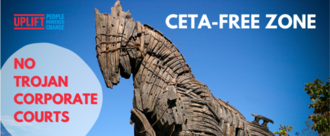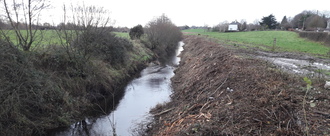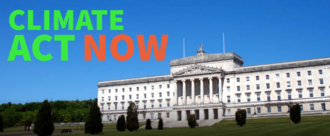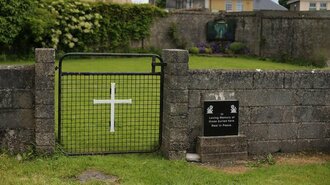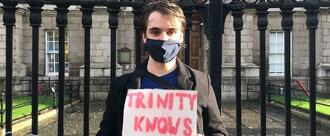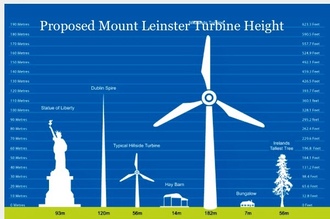- Featured
- Animal Rights
- Anti-racism
- Arts & Culture
- Children
- Climate
- Corporate accountability
- Crime
- Disability rights
- Economic
- Education
- Environment
- Food and Sustainable Production
- Gender Equality
- Governance and Transparency
- Health
- Housing
- LGBT Rights
- Mental health
- Northern Ireland
- Planning
- Privacy and Data Protection
- Rural Inequality
- Social Justice
- Trade
- Transport and Infrastructure
- Workers' Rights
- More
-
CETA Free Zone: Clare Says No To Corporate CourtsInvestor Court System (ICS) is a dispute settlement tribunal where foreign investors and corporations can take a case against Ireland for 'perceived' breaches in CETA’s investment protection standards. It allows investors to go straight to these special tribunals and sideline domestic courts and those of the European Union. Once CETA is ratified, investor court decisions cannot be challenged by either the State or the EU - this is the equivalent of handing corporations a blank cheque! Local communities and businesses across Ireland are fighting back. Together we are showing government parties and politicians that this form of corporate takeover is going to cost them dearly in the next election. And we need our local politicians to stand with us by supporting this. For more info on CETA ICS, check out this fact checker: https://comhlamh.org/wp-content/uploads/2021/02/CETA-ICS-Fact-Checker.pdf64 of 100 SignaturesCreated by Meghan Roe
-
CETA Free Zone: Cavan Says No To Corporate CourtsInvestor Court System (ICS) is a dispute settlement tribunal where foreign investors and corporations can take a case against Ireland for 'perceived' breaches in CETA’s investment protection standards. It allows investors to go straight to these special tribunals and sideline domestic courts and those of the European Union. Once CETA is ratified, investor court decisions cannot be challenged by either the State or the EU - this is the equivalent of handing corporations a blank cheque! Local communities and businesses across Ireland are fighting back. Together we are showing government parties and politicians that this form of corporate takeover is going to cost them dearly in the next election. And we need our local politicians to stand with us by supporting this. For more info on CETA ICS, check out this fact checker: https://comhlamh.org/wp-content/uploads/2021/02/CETA-ICS-Fact-Checker.pdf25 of 100 SignaturesCreated by Meghan Roe
-
CETA Free Zone: Carlow Says No To Corporate CourtsInvestor Court System (ICS) is a dispute settlement tribunal where foreign investors and corporations can take a case against Ireland for 'perceived' breaches in CETA’s investment protection standards. It allows investors to go straight to these special tribunals and sideline domestic courts and those of the European Union. Once CETA is ratified, investor court decisions cannot be challenged by either the State or the EU - this is the equivalent of handing corporations a blank cheque! Local communities and businesses across Ireland are fighting back. Together we are showing government parties and politicians that this form of corporate takeover is going to cost them dearly in the next election. And we need our local politicians to stand with us by supporting this. For more info on CETA ICS, check out this fact checker: https://comhlamh.org/wp-content/uploads/2021/02/CETA-ICS-Fact-Checker.pdf31 of 100 SignaturesCreated by Tricia O'Keefe
-
A glow in the dark section for New Ross to Waterford Greenway.With the excellent Waterford Greenway on our doorstep, we feel that we need to see an unrivaled offering on this Greenway. The addition of such an environmentally friendly segment, capable of emitting fluorescent light for 10 hours in the dark after absorbing sunlight all day long would be the first of its type in Ireland and would be sheer pleasure to walk or cycle over. (Imagine the Fáilte Ireland drone shots or how good this would be for the ‘darkness in to light’ walk.) Poland has one! Now let’s bring one to Ireland’s sunny south East. Please sign this petition and help make this a reality. https://www.sustainability-times.com/clean-cities/a-sun-powered-bicycle-path-glows-in-the-dark-in-poland/ WATCH: https://youtu.be/jmSs7ZBnUso776 of 800 SignaturesCreated by philip skelton
-
Environmental Bus Shelter @ the Community HallIt is important as over 30 children between primary & secondary school use this in the morning time & with our climate many mornings they are going into school saturated from the rain when waiting on the bus. We would like to provide shelter for them and have an eco approach to our strucure by creating a grass roof for biodiversity and the structure would include bird feeders and a bug hotel in the back of the structure .10 of 100 SignaturesCreated by Sharon Mckeever
-
Reform the Arterial Drainage ActThe Office of Public Works (OPW) is mandated under the Arterial Drainage Act 1945 to 'maintain' over 11,000km of river channel in Ireland - something that has resulted in the destruction of whole river systems. We need a new law that is fit to address the biodiversity and climate crisis and that works with - and for - people and nature.5,522 of 6,000 SignaturesCreated by Padraic Fogarty

-
Support an ambitious Climate Change Act for Northern Ireland #ClimateActNowOver ten years has passed since the UK Climate Change Act was passed and there is still no Northern Ireland specific Climate Change legislation. Northern Ireland is lagging behind, urgent and ambitious action is now required. As proposed in the cross-party Private Members Bill, we demand that a Northern Ireland Climate Act must include: - an overarching target to achieve net zero greenhouse gas emissions in Northern Ireland by 2045 - interim emissions reduction targets - a duty on government to bring forward a Climate Action Plan with sectoral targets and relevant policies/programmes and clear carbon budgets for each sector (to be laid before the NI Assembly within three years) - a duty on government to establish an independent monitoring and oversight body1,679 of 2,000 SignaturesCreated by Climate Coalition Northern Ireland
-
Provide any survivor or victim of Mother & Baby Home with a physical copy of the reportThe victims need access to the report in physical form for various reason including age and access to a computer. This should have been considered long before this as the victims now have to listen to all manner of commentators discuss their experiences without having access to the report.717 of 800 SignaturesCreated by S L
-
Upgrade Windows and Doors on the Tailteann and Dunloe Estates.Having a warm home is a basic human right. Windows and doors installed during construction of the estate are not fit for purpose and it is impossible to keep our homes warm. Residents are forced to burn fossil fuels to heat our homes. It is not good for the environment. We'd like council to engage in a replacement programme and install modern windows and doors.200 of 300 SignaturesCreated by Cllr Eddie Fennessy
-
TCD: Hold a Climate Assembly and ReferendumThe Mobilise Peace campaign is reaching out to universities across Ireland, the UK and globally in a peaceful and escalating campaign calling for them to support, encourage and prepare their student, alumni and staff populations for national peaceful civil disobedience. Our global climate and ecological systems are in a state of severe crisis. Our economic system, which demands infinite growth on a planet of finite resources, is largely to blame for the above crises. Furthermore it inflicts untold suffering on defenceless others here, and around the world in numerous other ways. [1] There are many peaceful, positive practical, and powerful alternatives to our current system. These alternatives should be decided by a citizens' assembly. Governments worldwide have proven themselves to be either unwilling or dilatory to implement the changes needed. New climate models to be published in 2021 predict heating of +5C by the end of the century, translating to as much as +10C over land. [2] For perspective, 2-3 degrees of warming will result in 2 billion climate refugees by 2100. [3, 4] Through 2050 net zero targets, inordinately high per capita emissions, and raised border policies, our national and EU governments are taking a trajectory consistent with climate genocide of the Global South. There is a great injustice occurring and there is strong reason to believe that policies, laws and lawful recourse to changing them will not work. Peaceful civil disobedience may thus present the best option and possibly last hope we have of bringing about positive societal change. [5, 6] The fastest way to rapidly change a society is through non-violent civil disobedience. This has been demonstrated time and time again throughout history — the Suffragettes, the Civil Rights Movement, resistance to apartheid in South Africa and the fight for India's independence from British rule. [6] References: 1. Sachs et al., 2020, Letter from economists: to rebuild our world, we must end the carbon economy The Guardian 2. Voosen, P., 2019. New climate models predict a warming surge. Science, pp.Science, 04/17/2019. 3. Vince, G. 2019 The heat is on over the climate crisis. Only radical measures will work. The Guardian 4. Xu et al., 2020, Future of the human climate niche, PNAS, 117, 11350 5. Lemons, J. & Brown, D., 2011. Global climate change and non-violent civil disobedience. Ethics in Science and Environmental Politics, 111, pp.312. 6. Chenoweth, E., &; Stephan, M. 2011. Why Civil Resistance Works: The Strategic Logic of Nonviolent Conflict Columbia University Press. fb.me/mobilisepeace fb.me/scientistrebellion fb.me/systemchangeinternational148 of 200 SignaturesCreated by Zac Lumley

-
Ag fas le cheile! Say yes to a 100 % Organic, Chemical-free and GMO-free IrelandDear Friends, I just created the petition: Ag fas le cheile! Say yes to a 100% Organic, 100% Chemical-free and 100% GMO-free Ireland. It would mean a lot to me if you took a moment to add your name because: A journey’s end matters not, for it is the journey itself that inspires, enriches and delights. As I took “the road less travelled” 18 months ago, I could not have imagined the amount of learning to be had on this road; for I am now less dependent on certain modern conveniences than I was in May 2019. Now in November 2020, I am • 100% shampoo-free • 100% clothes detergent-free • 100% washing-up liquid free • 100% dishwasher liquid free • 100% all-purpose cleaner free • 99% bin-free. In short, grey water that leaves my house is virtually chemical free with a minimal toxic load to the environment. My garden is 100% Organic, 100% Chemical-free and 100% GMO-free and has been for about 10 years. With the continued support from local Clare businesses and shops, Clare media and a waste prevention grant from Clare County Council, Operation de-Plastification with its “slim your bin or bin your bin challenge” has been able to inform, encourage, support and lead-by-example on the quest to waste reduction, particularly plastic related waste in the shape of single-use plastic bottles and plastic packaging. With the submission to Clare County Council for the Clare Local Development Plan 2022 – 2028 "100% Organic, 100% Chemical-free and 100% GMO-free", I am hoping to sow the seed for a different Clare, and by extension a different Ireland, to highlight a path that has been taken by other countries successfully and to encourage as many people of all ages and guises, including businesses and politicians, to re-think their habits and attitudes in relation to • everyday conveniences • everyday routines • everyday practices to aid the recovery of our planet, with an intact environment which in turn will support our future. The attempt to combine the Operation de-Plastification campaign and the vision for a post-pandemic County Clare, has generated the “ag fás le chéile” petition, where shoppers, sellers and consumers can voice, with their signature, their request for an enduring “green” Ireland. The petition aims to address all people living in Ireland: • Shoppers: we want to buy local, sustainable, affordable, nutritious, delicious, organic, plastic-packaging-free, chemical-free and gmo-free goods • Sellers: we want to sell local, sustainable, affordable, nutritious, delicious, organic, plastic-packaging-free, chemical-free and gmo-free goods • Consumers: we want to enjoy local, sustainable, affordable, nutritious, delicious, organic, plastic-packaging-free, chemical-free and gmo-free goods Assuring our environment’s and our survival, “the road not taken” may lead to a life and life-style where less is more, as less is more than enough in my experience. With the kindest regards, Cornelia Wahli Operation de-Plastification Campaign Slim your Bin or Bin your Bin Challenge “Ag fás le chéile” Petition ____________________________________________________________________ https://my.uplift.ie/petitions/ag-fas-le-cheile-say-yes-to-a-100-organic-chemical-free-and-gmo-free-ireland Real change happens when everyday people like you and I come together and stand up for what we believe in. Together we can reach lots of people and help create change around this important issue. After you've signed the petition, could you also take a moment to share it with others? It's really easy – all you need to do is forward this email. Thank you!75 of 100 SignaturesCreated by cornelia wahli
-
SAVE MOUNT LEINSTER FROM INDUSTRIAL DEVELOPMENTCoillte proposes to build 7 colossal wind turbines on the slopes of Mt Leinster, adjacent to a Special Area of Conservation. With a proposed height of 178m, significantly higher than any existing turbine in the region, this scale is normally placed offshore. There has been inadequate public consultation about this wind farm proposal and the majority of the local community are unaware of it. As local representatives, we urge you to safeguard this visually sensitive and ecologically valuable area and to protect our natural heritage for future generations. We appeal to you to collaborate in order to save Mt Leinster and the Blackstairs by taking the following measures: 1. Suspend the current windfarm planning application process until circumstances allow for appropriate public consultation. Coillte’s planning strategy has deprived the local and wider community of their right to engage in meaningful participation. 2. Introduce an immediate moratorium on new wind farm developments pending updating of the outdated 2006 national wind energy guidelines. 3. Strengthen County Carlow’s Wind Energy Strategy (WES) by making Mt Leinster and The Blackstairs a “No Go” area for windfarm development and industrialisation of any sort. 4. Strengthen legislation to protect our biodiversity and our Special Areas of Conservation (SACs). 5. Protect and preserve our wild places. • This proposed windfarm would destroy the Mt Leinster region and have a hugely negative impact on local tourism. Mt Leinster attracts locals and visitors from all over the country to its mountain wilderness. They engage in all sorts of activities from strolling along the beautiful country lanes in the unspoilt rural foothills of south County Carlow, to hillwalking, mountain biking, paragliding, kite flying, eco trailing, foraging and birdwatching. - The proposed turbines would be directly in front of the Nine Stones, a designated protected viewing point. The wonderful panoramic vista that currently greets visitors would be replaced by the sight, sound and flicker shadow of these massive industrial turbines, which would totally dominate the landscape. - The turbines would be seen from many scenic trails in Ireland’s Ancient East including The South Leinster Way, The Mount Leinster Heritage Drive, The Sky Road and newly launched Turas Columbanus part of the Europe-wide Columban Way. • With the exception of a small group of local landowners who were briefed in Oct 2019, there has been no public consultation by Coillte. Notwithstanding Covid 19 restrictions, there was no dissemination of information by any means for over a year. - An online information site about the proposed windfarm only went live at the end of Nov 2020 - see www.croaghaunwindfarm.ie approximately 9 days before the planning process began. - The distribution of an information brochure, only circulated in the first week of Dec 2020, was limited to houses within 2km of the proposed windfarm. • Of additional concern is the proposed access route for transport of building materials from Bunclody to Mt Leinster. This route runs through an area of outstanding natural beauty comprising narrow country roads, lined with ancient hedgerows and granite stone walls. They represent a rapidly vanishing aspect of our built and natural heritage. Once destroyed they can never be replaced. Coillte state that they will “temporarily upgrade” this road in order to facilitate transport of oversize loads, which would include 110M columns and 65M rotor blades. • The windfarm would also have a detrimental ecological impact. The Blackstairs contains a vast SAC, a designation which protects endangered habitats and biodiversity. The proposed windfarm site is just 400M from this SAC boundary. Only 13% of Ireland has SAC status. In this time of biodiversity crisis it is profoundly ecologically unsound to build an industrial wind farm so close to an SAC. - The proposed construction site is partly comprised of blanket bog. The recent catastrophic bogslide in Donegal demonstrates the devastating environmental destruction wreaked by inappropriate windfarm planning on bogland. • The new climate emergency bill has identified offshore wind energy as the most efficient solution to Ireland’s climate crisis. Our government has committed to the rapid development of this technology early next year. - It makes no sense to put gigantic and environmentally destructive wind turbines on land in one of the most scenic parts of Ireland when a much more efficient and environmentally sensitive technology will be available offshore in the near future. • Carlow’s WES describes the Mt Leinster/ Blackstairs region as unsuitable for windfarm development because of its value for tourism, the high quality of its scenery and the sensitivity of its landscape. - This same strategy states that Mt Leinster and 14 other areas across the Blackstairs are still “open for consideration” for windfarm development. - This anomaly needs to be addressed - if planning permission is granted for this windfarm it will set a precedent and create the potential for the proliferation of windfarms throughout The Blackstairs. • Currently there are very few wind turbines on the Carlow Blackstairs, but the NW corner of the Wexford Blackstairs is saturated with them. - Wexford’s WES has responded to this by making the Wexford Blackstairs a “ No Go area" for windfarms. - Can Carlow County Council collaborate with Wexford County Council and treat The Blackstairs mountain range as a single entity and protect it accordingly? • Mt Leinster and the Blackstairs have escaped the industrialisation that has blighted so many other parts of rural Ireland. Wild unspoilt places are few and far between. Once lost they are gone forever.3,651 of 4,000 SignaturesCreated by The Blackstairs and Barrow Valley Network .


